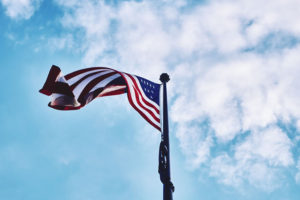War is hell.
 And, if the converse is also true – hell is war – we have some days of hell and rumors of hell ahead of us (Matthew 24:6).
And, if the converse is also true – hell is war – we have some days of hell and rumors of hell ahead of us (Matthew 24:6).
Remember the first 10 days of the Trump administration? America experienced a new level of chaos and disorder with each executive action taken (see list). Protestors in major U.S. cities, even non-Americans from London to Tokyo, took to the streets to express their frustration and resistance to Trump’s policies, even to the man himself.
Yet, there’s one group in the world who seemed to be very pleased with the new leader of the free world and they proclaimed a strategy to defeat America: ISIS.
Noting chatter on blogs and forums, members of the radical terrorist group seem to have torn a page right out of 2 Chronicles – a strategic principle that we as followers of Christ have seen time and again by the power of God.
Let’s take a look.
King Jehoshaphat’s Playbook (2 Chronicles 20)
When King Jehoshaphat received word of imminent danger from the united armies of Ammon, Moab, and Seir, he called for a time of fasting and prayer for the nation and petitioned God for guidance.
A young priest named Jahaziel prophesied (verses 15-17):
“Do not be afraid or discouraged because of this vast army…for the battle is not yours, but God’s. You will not have to fight this battle. Take up your positions; stand firm and see the deliverance the Lord will give you, Judah and Jerusalem. Do not be afraid; do not be discouraged. Go out to face them tomorrow, and the Lord will be with you.”
On the day of (God’s) battle, King Jehoshaphat sent singers and worshippers ahead of the army to sing praises to God.
As the praises went forth, in an unbelievable turn of events, the armies of Ammon and Moab destroyed the army of Seir. Then, Ammon and Moab turned on themselves and destroyed each other. Not one soldier was left standing from any of the 3 armies.
So, what is the ISIS strategy and prayer?
“O God, destroy the oppressors by the hand of the oppressors and let us escape them unharmed.”
If President Trump can be used as a puppet (of the enemy) to divide and cause Americans to fight amongst themselves, could America suffer the same defeat as Ammon, Moab, and Seir?
United We Stand, Divided We Fall
Let’s face it. Between King Jehoshaphat or ISIS – the principle of war remains true:
A divided enemy is easier to defeat than a unified one.
America is not exempt. And, quite frankly, God’s time of patience may be wearing thin. American policies have attempted to supersede divine authority. Christ-followers have been fortunate to not experience widespread persecution on American soil. America has even been able to hide her own dirty deeds in election meddling around the world.
Her pride and arrogance are in full bloom, and her citizens are ripe to eat the fruit thereof.
Yes, we are to pray for our nation and leader, and God can do the impossible. Yet, until our nation repents and turns to God, we will be unsuccessful in defeating our enemies as a divided, distracted, and chaotic nation.
But, notice what God says about people who walk together in agreement:
“The people are united, and they all speak the same language. After this, nothing they set out to do will be impossible for them!” Genesis 11: 6
There is power in agreement, Team. There is strength in unity. The quest for unity is so important that Jesus himself prayed to the Father on our behalf, repeating: “Lord, make them one as we are one.” (John 17:11, 21-23)
But, let’s be clear. When the battle belongs to God, when God Himself fights for us, our enemies – no matter how unified or united – will always face defeat at the hands of our undefeated, unbeatable God.
So, What’s The Play Call?
Unite. There’s never been a better time for the body of Christ to unify. Just as ISIS celebrated Trump as their new recruiting tool, disagreement, unforgiveness, and racism in the church are applauded by the devil and used as a tool to keep us ignorant of his schemes (2 Corinthians 2:11).
It’s time to develop one unified voice on the substantive concerns within the church. What does the Word of God say? Have you surrendered your understanding to the Holy Spirit so that He can show you the way? Is your personal agenda or bias submitted to God? Do you encourage others, in love, to know the truth?
Let’s maximize the grace in each day to get our lives together individually – and collectively as Christ followers. As my Bishop would always say, “You can fight better in an army than you can by yourself.”
I’d add – especially when that army is united as one.




